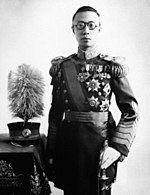About Puyi
- Puyi (; simplified Chinese: ??; traditional Chinese: ??; pinyin: Puyí; 7 February 1906 – 17 October 1967) was the last Emperor of China as the 12th and final Emperor of the Qing dynasty, China's last imperial dynasty.
- As a child, he reigned as the Xuantong Emperor (pronounced [?wánt??`?]; Chinese: ???; Manchu: ??????????????????; Möllendorff: gehungge yoso huwangdi) in China and Khevt Yos Khaan in Mongolia from 1908 until his forced abdication on 12 February 1912, after the Xinhai Revolution.
- He was briefly restored to the throne as emperor by the warlord Zhang Xun from 1 July to 12 July 1917. In 1932, after the Japanese invasion of Manchuria, the puppet state of Manchukuo was established by Japan, and he was chosen to become "Emperor" of the new state using the era-name of Datong (Ta-tung).
- In 1934, he was declared the Kangde Emperor (or Kang-te Emperor) of Manchukuo and ruled until the end of the Second Sino-Japanese War in 1945.
- After the People's Republic of China was established in 1949, Puyi was imprisoned as a war criminal for 10 years, wrote his memoirs and became a titular member of the Chinese People's Political Consultative Conference and the National People's Congress.
Read more at Wikipedia
See Also
- Famous People's Birthdays on 07 February, China
- Famous People's Birthdays in February, China
- Famous writer's Birthdays on 07 February, China
- Famous writer's Birthdays in February, China
- Famous archivist's Birthdays on 07 February, China
- Famous archivist's Birthdays in February, China
- Famous gardener's Birthdays on 07 February, China
- Famous gardener's Birthdays in February, China
- Famous aristocrat's Birthdays on 07 February, China
- Famous aristocrat's Birthdays in February, China


 Date of Birth:
Date of Birth:  Place of Birth: Prince Chun Mansion, Beijing, China
Place of Birth: Prince Chun Mansion, Beijing, China